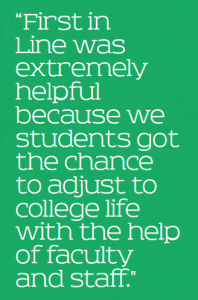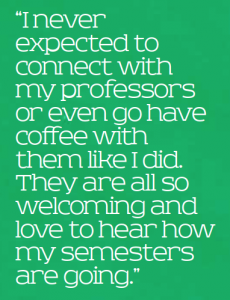With its First in Line program, Baylor is equipping its first generation students to make a successful transition to campus life
By Julie Carlson
Imagine if you were told you’d soon be making an extended stay in a faraway country you’d never visited before. But what could be an exciting new adventure is tempered by the fact that you don’t speak the native language, you have no idea of the country’s traditions or customs, and no one you know –– neither friends nor family –– can help you prepare because they’ve never been there, either.
Substitute the words “college” or “university” for “country,” and you’ll begin to see some of the challenges faced by first-generation students at American colleges and universities –– those who are about to become the first member of their families to attend an institution of higher education.
Cade Cowart is one such student. When he decided to forgo a relaxing summer after high school graduation and instead move across country to jump into college life, his friends thought he was crazy. But Cowart is just one of a growing number of first-generation students benefiting from a new Baylor University program designed to help them get a head start on university living –– and he said it was the best decision he’s ever made.
Cowart, a sophomore pre-neuroscience major from Florida, took advantage of Baylor’s First in Line Summer Advantage program in 2015. First in Line, now in its third year on the Waco campus, provides resources and support to first generation college students.
“We define first generation students as those whose mom or dad did not earn a bachelor’s degree. Other universities define first generation students as those whose parents have not attended any college, whether community college or technical school, but we intentionally made our definition broad so that we can serve a broad population of students,” said Michelle Cohenour, the assistant director of student success who directs Baylor’s First in Line program.
According to Cohenour, about one out of every eight Baylor students qualifies as a first generation student. These students often need help in navigating the higher education landscape, learning everything from terminology and how to meet with academic advisors to gaining an understanding of financial aid and campus office hours.
Kelli Boyd, a sophomore political science major from Oregon, joined Cowart as a member of the summer 2015 First in Line program.
 “First in Line was extremely helpful because we students got the chance to adjust to college life with the help of faculty and staff members who knew we were first generation students and understood some of the difficulties we might face,” Boyd said. “We weren’t thrown into a sea of thousands of students the minute we arrived on campus. The relationships we were able to build with faculty and staff members as well as our fellow first generation students were probably the best things that we could have gotten out of the program.”
“First in Line was extremely helpful because we students got the chance to adjust to college life with the help of faculty and staff members who knew we were first generation students and understood some of the difficulties we might face,” Boyd said. “We weren’t thrown into a sea of thousands of students the minute we arrived on campus. The relationships we were able to build with faculty and staff members as well as our fellow first generation students were probably the best things that we could have gotten out of the program.”
As veterans of Baylor’s inaugural First in Line Summer Advantage, Boyd and Cowart came back in 2016 to serve as peer leaders in the program. Summer Advantage allows new first-gen students to complete two classes (out of a possible 15 that are offered) during the second summer school session while receiving academic mentoring, tutoring, weekly success seminars and team building activities. For a flat fee of $3,000 fee they are not only enrolled in the two classes, but receive meals and lodging in a campus residence hall and are eligible for all program activities. The summer 2015 program had 30 participants, while the 2016 version had 31.
“During the summer program we had classes during the morning and studying and tutoring during the evenings,” Cowart said. “On Tuesday and Thursday, guest speakers were brought in to give us some really good advice on surviving our first year at Baylor. On Saturdays we had various activities, from the high ropes team building course to community service projects and the Great Baylor Amazing Race. We would go to church on Sunday, and even when we weren’t doing something organized we were still doing something with the group. The peer leaders often took us for ice cream or showed us local attractions around Waco. It was all very helpful.”
The summer program focuses on integrating First in Line students into the Baylor culture, and the 2016 First in Line added more programming for parents, both during the Summer Advantage program and during orientation.
“This past summer, we did a parent send-off in which parents were able to talk through their hopes and fears about their child’s college journey, and they learned how our staff can support them,” Cohenour said. “During orientation we had a first generation parent sit on our parent panel during the parent dinner, and we will have ongoing communication with parents. Parents have a lot to offer and their knowledge matters. We want to be receptive to their needs and find ways to expand to include them more.”
During the fall and spring semesters, events for First in Line student continue with monthly workshops, a welcome-back barbecue, faculty dinners and more. Students are welcome at such events throughout their Baylor journey, but Cohenour has found that most of the intervention is needed during the students’ first year at Baylor.
“Our goal is that students won’t need us as much once they get settled in. They will find a home within their academic disciplines and in the many student organizations Baylor offers,” she said.
Cohenour feels fortunate that she has great staff members in place to help with the program. Two members of AmeriCorps VISTA, a national and community service program, help enroll students in First in Line, take part in Baylor admission events and visit high schools to talk about college readiness and college access.
“We promote higher education in general and help spread the word that higher education is attainable,” said Jorge Vielledent, a VISTA member and Baylor alumnus who earned a BA in psychology. “I often spend my days calling admitted students to tell them about the program and its benefits. I have enjoyed working with students so much that I hope to work with Baylor admissions after my time with First in Line is over.”
Vielledent has been impressed with the number of Baylor faculty who are interested in the program.
“Everybody wants to find a way to help us out. I have professors email me almost every day and many of them were first generation themselves,” he said.
One such Baylor faculty member who was the first in his family to attend a university is Dr. Todd Buras, associate professor of philosophy. He served on a Baylor task force that examined ways to improve Baylor’s support for first generation college students, taught during Summer Advantage 2016 and took part in its extracurricular activities.
“I know firsthand what it is like to be a first generation college student, and I know how valuable it is to make contact with a faculty member who takes your interests to heart,” Buras said. “First generation college students are typically incredibly smart, driven and ambitious. They come to college on a mission to improve their lives and the lives of those they love. They usually have their whole family cheering for them. But they have few in their immediate family who have been down the road they are traveling, and therefore have few people who can help them navigate the maze of the modern university.”
Buras said programs such as First in Line can make an impact on students.
“The transition to college is not easy for anyone, but it is especially challenging for these students. A little effort at the beginning to make sure they know the ropes pays huge dividends for these students and for the university,” he said. “I am proud to be part of Baylor’s effort to throw our doors wide open to first generation students.”
Cowart said interaction with faculty members such as Buras has been a highlight of the program.
 “I have seen many of the faculty and staff around campus and I like to stop and chat with them,” he said. “I never expected to connect with my professors or even go have coffee with them like I did. They are all so welcoming and love to hear how my semesters are going.”
“I have seen many of the faculty and staff around campus and I like to stop and chat with them,” he said. “I never expected to connect with my professors or even go have coffee with them like I did. They are all so welcoming and love to hear how my semesters are going.”
Boyd agrees. She said several professors who taught throughout the Summer Advantage program attended one or more of the weekly group dinners to speak with first generation students and got to know them better. Students also got the chance to meet with faculty members on a closer level within their small groups and even have dinner at a professor’s home.
“The most helpful part of First in Line was learning whom to ask when I needed help, as well as getting to know that I wasn’t alone and that someone was there for me no matter what I needed,” Boyd said. “I love what First in Line stands for and how much everyone cares. I would absolutely recommend it as a great way to get involved and get connected with other students that you have something in common with. Choosing to be a part of First in Line is one of the best decisions that I’ve made so far in my life.”
————————-
This article originally appeared in the Fall 2016 issue of Baylor Arts & Sciences magazine, the official publication of the Baylor University College of Arts & Sciences.




Absolutely love and appreciate this program! My daughter was in the first group of 30 in 2015. As a parent, it was extremely reassuring to know she would not simply be thrown into a ‘sink or swim’ situation amongst the masses, but had faculty and staff whom she could rely upon to help make her transition into Baylor/college life much more smooth. Some of her closest friends now are ones she met during this experience. THANK YOU for allowing her to participate!